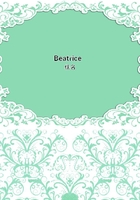
第20章 OWEN DAVIES AT HOME(4)
Thomas and her horn-rimmed eyeglasses, to return no more. The truth of the matter was, however, that young as was Beatrice, he fell in love with her then and there, only to fall deeper and deeper into that drear abyss as years went on. He never said anything about it, he scarcely even gave a hint of his hopeless condition, though of course Beatrice divined something of it as soon as she came to years of discretion. But there grew up in Owen's silent, lonely breast a great and overmastering desire to make this grey-eyed girl his wife. He measured time by the intervals that elapsed between his visions of her. No period in his life was so wretched and utterly purposeless as those two years which passed while she was at her Training College. He was a very passive lover, as yet his gathering passion did not urge him to extremes, and he could never make up his mind to declare it.
The box was in his hand, but he feared to throw the dice.
But he drew as near to her as he dared. Once he gave Beatrice a flower, it was when she was seventeen, and awkwardly expressed a hope that she would wear it for his sake. The words were not much and the flower was not much, but there was a look about the man's eyes, and a suppressed passion and energy in his voice, which told their tale to the keen-witted girl. After this he found that she avoided him, and bitterly regretted his boldness. For Beatrice did not like him in that way. To a girl of her curious stamp his wealth was nothing. She did not covet wealth, she coveted independence, and had the sense to know that marriage with such a man would not bring it. A cage is a cage, whether the bars are of iron or gold. He bored her, she despised him for his want of intelligence and enterprise. That a man with all this wealth and endless opportunity should waste his life in such fashion was to her a thing intolerable. She knew if she had half his chance, that she would make her name ring from one end of Europe to the other.
In short, Beatrice held Owen as deeply in contempt as her sister Elizabeth, studying him from another point of view, held him in reverence. And putting aside any human predilections, Beatrice would never have married a man whom she despised. She respected herself too much.
Owen Davies saw all this as through a glass darkly, and in his own slow way cast about for a means of drawing near. He discovered that Beatrice was passionately fond of learning, and also that she had no means to obtain the necessary books. So he threw open his library to her; it was one of the best in Wales. He did more; he gave orders to a London bookseller to forward him every new book of importance that appeared in certain classes of literature, and all of these he placed at her disposal, having first carefully cut the leaves with his own hand. This was a bait Beatrice could not resist. She might dread or even detest Mr. Davies, but she loved his books, and if she quarrelled with him her well of knowledge would simply run dry, for there were no circulating libraries at Bryngelly, and if there had been she could not have afforded to subscribe to them. So she remained on good terms with him, and even smiled at his futile attempts to keep pace with her studies. Poor man, reading did not come naturally to him; he was much better at cutting leaves. He studied the /Times/ and certain religious works, that was all. But he wrestled manfully with many a detested tome, in order to be able to say something to Beatrice about it, and the worst of it was that Beatrice always saw through it, and showed him that she did. It was not kind, perhaps, but youth is cruel.
And so the years wore on, till at length Beatrice knew that a crisis was at hand. Even the tardiest and most retiring lover must come to the point at last, if he is in earnest, and Owen Davies was very much in earnest. Of late, to her dismay, he had so far come out of his shell as to allow himself to be nominated a member of the school council. Of course she knew that this was only to give him more opportunities of seeing her. As a member of the council, he could visit the school of which she was mistress as often as he chose, and indeed he soon learned to take a lively interest in village education.
About twice a week he would come in just as the school was breaking up and offer to walk home with her, seeking for a favourable opportunity to propose. Hitherto she had always warded off this last event, but she knew that it must happen. Not that she was actually afraid of the man himself; he was too much afraid of her for that. What she did fear was the outburst of wrath from her father and sister when they learned that she had refused Owen Davies. It never occurred to her that Elizabeth might be playing a hand of her own in the matter.
From all of which it will be clear, if indeed it has not become so already, that Beatrice Granger was a somewhat ill-regulated young woman, born to bring trouble on herself and all connected with her.
Had she been otherwise, she would have taken her good fortune and married Owen Davies, in which case her history need never have been written.